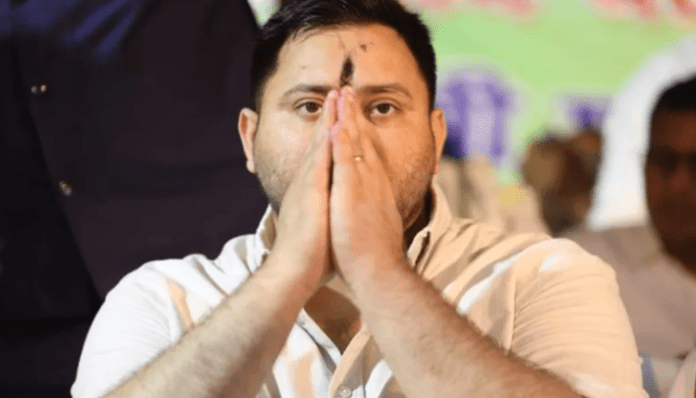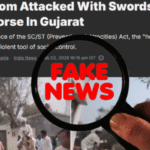Assembly elections are scheduled to take place in Bihar this year. Both the ruling and opposition parties are actively preparing for the contest. The media has once again entered the phase of political interviews and Tejashwi Yadav, the Leader of the Opposition in Bihar Legislative Assembly, engaged in an extensive discussion lasting approximately 57 minutes with the news agency ANI.
During the conversation, he made several accusations against the Bharatiya Janata Party (BJP)-led National Democratic Alliance (NDA) and Chief Minister Nitish Kumar. He tried to present the situation in Bihar as deteriorating. He also asserted that the 2020 assembly election was rigged, resulting in the Rashtriya Janata Dal’s (RJD) defeat and expressed confidence that his party would emerge victorious in the state this time.
There is nothing unexpected about this. During the election season, each party or leader denounces their rivals as incompetent. Until the final results are revealed, every party and their members proclaim success. After the election, they search for a scapegoat to accuse for their loss.
During this interview, Tejashwi Yadav also directed his criticism towards the media, which has emerged as one of the primary duty for opposition leaders since Narendra Modi’s rise in Indian national politics. He sought to hold the media accountable for everything from Prime Minister Narendra Modi’s third consecutive victory in the general elections to the prevailing lawlessness in Bihar.
He alleged that the media has become subservient and the saffron party is succeeding due to its propaganda. When he was inquired about the instances where the media, from Bihar to the national level, has treated him unfairly, Tejashwi Yadav replied that whenever his party is in power, even the death of a cockroach is blown out of proportion. Today, crimes are occurring, yet no one refers to it as “Jungle Raj.”
He charged that whenever any incident takes place, the criminal is associated with his party and its members. The media portrays him as a close confidant of Lalu Prasad Yadav and Tejashwi Yadav. He mentioned that the media presents RJD governments as “Mahajungleraj.” It is asserted that during that time, people did not come out because they used to be abducted.
Moreover, Tejashwi Yadav insisted that the evaluation of the law and order situation should be based solely on statistical data. When comparing the crime statistics of RJD administrations with those of the NDA government, it becomes evident that criminal activity is at its peak during Chief Minister Nitish Kumar’s tenure. However, the media is not raising any concerns.
The entire conversation can be heard from 12 minutes to 17 minutes and 40 seconds in the video linked below.
Jungle Raj is the brutal past of Bihar
The term “Jungle Raj” is frequently referenced in the political landscape of Bihar. This phrase denotes the era from 1990 to 2005, during which Tejashwi Yadav’s parents, Lalu Prasad Yadav and Rabri Devi, held the position of Chief Ministers in the state. During this time, Bihar was plagued by a series of horrific caste massacres. The slogan “Bhura Baal Saaf Karo” (remove Brahmin, Bhumihar, Rajput and Kayasth from Bihar) echoed throughout there.
Kidnapping turned into a booming “industry.” Showrooms were ransacked during the wedding of the chief minsiter’s daughter, leading to a mass exodus of businessmen due to fear. The state witnessed the decline of both livelihood and educational as well as health institutions. The public endured bumpy rides on potholed lanes, while those who promised to create roads as smooth as actress Hema Malini’s cheeks were in power. This was indeed a dark age characterized by the use of lanterns.
Bihar witnessed the RJD leader who had the two sons of a man named Chanda Babu from Siwan doused in acid and got the other one shot, the RJD MLA who kidnapped a Dalit girl from her residence and forced her into his jeep after whcih she was repeatedly raped. Likewise, wife, mother, and niece of IAS officer BB Vishwas were subjected to sexual abuse for a duration of two years. When this issue came to light, it appeared that the entire government was engaged in efforts to protect the perpetrators.
Meanwhile, Tejashwi Yadav sought to counter the reality of “Jungle Raj” by providing examples. I have mentioned a few instances when RJD was in power in Bihar, however, the list is so extensive and horrifying that my fingers would tire, keyboards would break under the strain and your eyes would grow weary while reading, yet, the documented instances of Jungle Raj will not come to an end, along with many more that remain unrecorded.
Tejashwi Yadav must indicate which of these occurrences pertains to the death of a cockroach. Additionally, he should clarify which of these events involved individuals who had no ties to the RJD or were referred to as cockroaches.
Can addressing statistics wash away the reality of Jungle Raj
It is indeed accurate that the manner in which Nitish Kumar tackled crime and dealt with criminals during his initial term was not replicated subsequently. The primary reason for this is Janata Dal (United)’s alliance with the RJD on two separate occasions. Furthermore, it is also a fact that if one considers the number of crimes reported to the Bihar Police as the sole measure, the figures seem significantly greater than those recorded during the 15 years of Lalu-Rabri.
Nevertheless, this is incomplete truth. With the rise of media, particularly social media, it has become increasingly difficult to conceal any criminal activity. Individuals are now more inclined to visit police stations to file reports. This trend is observable not only in Bihar but also in other states, where one can similarly note higher statistics.
However, “Jungle Raj” cannot be measured only by the frequency of crimes. The statistics reflect the murder of Chanda Babu’s three sons as merely homicides. Yet, do these figures convey the brutality of their deaths? What kind of fear did Chanda Babu suffer throughout his life? How many parents were left terrified by this occurrence? How many Mohammad Shahabuddins were emboldened to disregard the law?
The numbers might indicate the scale of murders and abductions that happened, but do they also unveil that killings and kidnapping had transformed into an “industry” during the period? That it became a business, a source of income? That such a collaboration among politicians, officials and mafias had never been witnessed before? Most importantly, that the criminal empire was sustained by brother-in-laws and dreaded gangsters like Mohammad Shahabuddin?
Whether the Bathe massacre or any other incident of caste violence, the data will only reflect the murder of a few individuals. It does not illustrate the profound effect this had on the Bhumihar population. Statistics do not disclose the apprehension generated among the upper castes by the slogan “Bhura Baal Saaf Karo.” The data also does not show that people in Bihar started to hide their surnames.
Jungle Raj not a fabrication of media
Tejashwi Yadav attempted to claim that “Jungle Raj” is a media fabrication and portrayed the media before 2014 as “innocent.” The truth is that before 2014, the media was kind to Lalu Prasad Yadav, who was convicted in the fodder scam and the situation is not any different even today.
Whether it is mainstream media or the liberal-leftist faction, they initially tried to create an image of Lalu as a messiah of social justice. They painted him as a tall figure in politics. Later, they attempted to label him as a “management guru.” The gracious media even interpreted his kurta-tearing antics as a form of Holi celebration.
The courage demonstrated by the Biharis was remarkable, as they did not falter in the presence of these visuals. They advanced, challenging the adversities of “Jungle Raj.” They undertook legal battles. Social media served as a platform for them to talk about incidents that had been suppressed. As a result, the media was also compelled to recognize the truth of “Jungle Raj.”
Tejashwi Yadav should express gratitude towards this media, as it envisions a promising future for Bihar with him at the helm. It tries to erase the blemish of his party’s “Jungle Raj.” It attempts to portray what is referred to as “Jungle Raj” as “peaceful days,” by showcasing crime statistics.
However, it is unfortunate for Tejashwi Yadav that the reality of “Jungle Raj” is so firmly entrenched in Bihar that it cannot be swayed by these hollow arguments. Bihar’s “good fortune” lies concealed within the misfortune of Lalu Prasad Yadav’s entire family.
Read the report in Hindi here.













